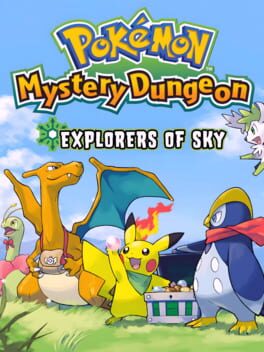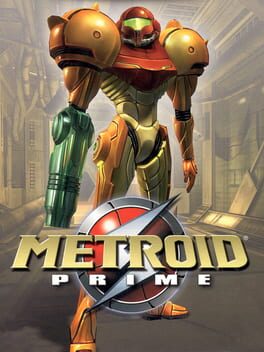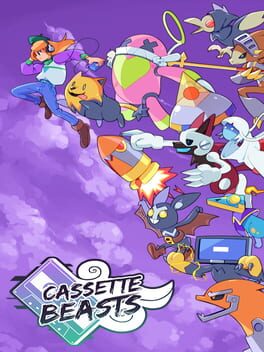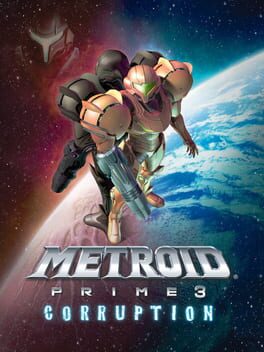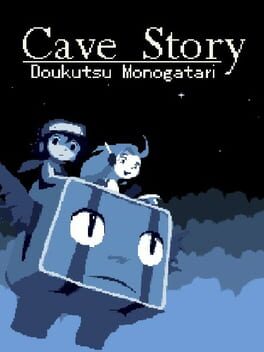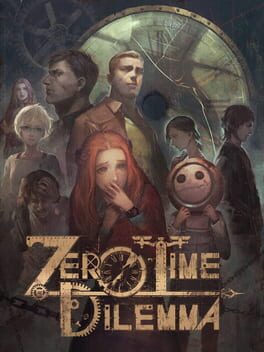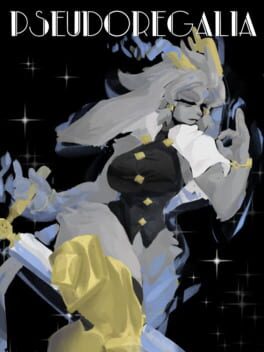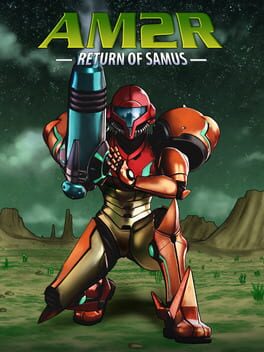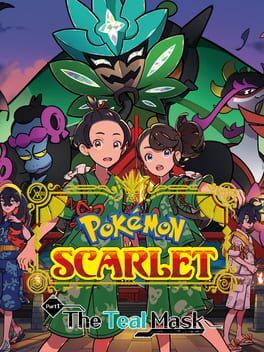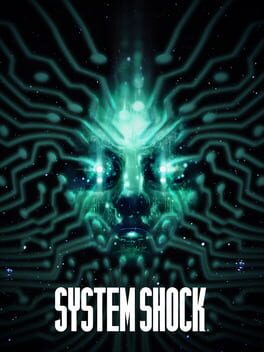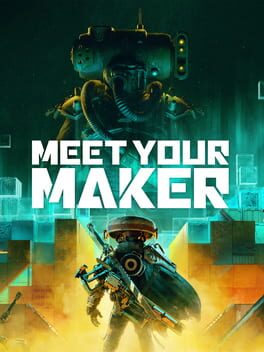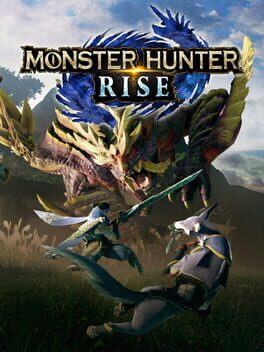RaffiTheOwl
I've been going between 3.5 and 4 stars for this. PMD: EoS is an interesting game that struggles with pacing. Its narrative can feel sluggish, as its attempts to explain itself to a (very) young target audience can make dialogue repetitive, especially with its reliance on flashbacks to very recent events. At the same time, many of its most interesting & effective emotional beats (mainly its eleventh-hour dramatic reveal it) feel like they would have benefited from being introduced earlier and given more time to stew & develop.
Its pacing issues also extend to its mechanics, with filler missions padding out playtime (and almost entirely constituting the postgame). Again, some of its interesting mechanics are held back later than seem necessary, such as the SOS Mail (a fantastic concept that allows players to "rescue" each other from wiping in some dungeons) and evolution, which is incomprehensibly withheld entirely until the post-game and only fully usable on the main two characters after the postgame.
That being said, there's a lot to appreciate with EoS. It leans into its randomness effectively, with mechanics adapted from the mainline Pokemon series that can effectively create surprising emergent scenarios. (Those surprises range from humorous to infuriating, but the main game is broadly gentle enough to make the worst "That's bullshit!" moments fleeting.) There's a lot of care & charm in rare little things a player may never see. The plot, while often simple, has a lot of effective characterization & charm to it, and it delivers a surprisingly strong emotional blow at its end. The spritework is fantastic, and the music is as energetic and fun as the game's visuals.
At its best, it's very hard to put down, mixing a nearly-Firaxis level of "one more turn" syndrome with delightful charm and a spark of wonder. At its worst, it's shallow in ways that hurt because of how much potential it displays. Ultimately, it's a game that I expect will feel cozy & nostalgic for fans of Pokemon & kid lit, and may be middling for those who don't care about either.
Its pacing issues also extend to its mechanics, with filler missions padding out playtime (and almost entirely constituting the postgame). Again, some of its interesting mechanics are held back later than seem necessary, such as the SOS Mail (a fantastic concept that allows players to "rescue" each other from wiping in some dungeons) and evolution, which is incomprehensibly withheld entirely until the post-game and only fully usable on the main two characters after the postgame.
That being said, there's a lot to appreciate with EoS. It leans into its randomness effectively, with mechanics adapted from the mainline Pokemon series that can effectively create surprising emergent scenarios. (Those surprises range from humorous to infuriating, but the main game is broadly gentle enough to make the worst "That's bullshit!" moments fleeting.) There's a lot of care & charm in rare little things a player may never see. The plot, while often simple, has a lot of effective characterization & charm to it, and it delivers a surprisingly strong emotional blow at its end. The spritework is fantastic, and the music is as energetic and fun as the game's visuals.
At its best, it's very hard to put down, mixing a nearly-Firaxis level of "one more turn" syndrome with delightful charm and a spark of wonder. At its worst, it's shallow in ways that hurt because of how much potential it displays. Ultimately, it's a game that I expect will feel cozy & nostalgic for fans of Pokemon & kid lit, and may be middling for those who don't care about either.
2002
I won't pretend this game doesn't have flaws, namely in the back half's pacing. But two elements deserve exceptional respect: the sense of place, and the happy accidents.
The sense of place is hard to miss while playing, but it rewards intentional attention. The details are just stunning, especially considering this was before throwing complex geometry & high-res textures on things was "free" (insofar as performance is concerned). Whether it's the atmospheric soundtrack, the bite-sized sprinklings of worldbuilding the Scan Visor offers, or the way each interstitial hallway has varying depth and implied purpose, it's a lot to baste in. As a child, I would treat some game worlds more like sandboxes to play in rather than linear experiences, and Metroid Prime offered a lot to enjoy with that kind of in-the-moment play.
And the happy accidents. Whoo, boy. Being a Metroidvania, this is a game about acquiring things that change your relationship to your environment, recontextualize places you have been, and open up ways to progress. By design, it does this with items. By accident, it does this with knowledge. Yes, I'm going to discuss the glitches in this game - if talking about things that were neither intended by developers nor affect the average player's playthrough doesn't interest you, fine. I think art is worth evaluating for how it arrives, separate from intent - and the wealth of knowledge there is to plumb from this game is vast, deep, and rewarding. I've been learning this game's dark arts for about two years now (in conjunction with the excellent randomizer mod), and I'm still learning more every run.
I don't expect the average player to try any of that out, though. I expect most will play through it once, have a ball in the first half and gradually tire in the second. But with time and study, this game appreciates in value. If you've already played it, check out a commentated speedrun. Watch them fling themselves at incredible speeds, hop around obscure geometry, and maybe even turn into a math-breaking ball of light, and you'll have a glimpse of the strange beauty of this game's accidental depths.
The sense of place is hard to miss while playing, but it rewards intentional attention. The details are just stunning, especially considering this was before throwing complex geometry & high-res textures on things was "free" (insofar as performance is concerned). Whether it's the atmospheric soundtrack, the bite-sized sprinklings of worldbuilding the Scan Visor offers, or the way each interstitial hallway has varying depth and implied purpose, it's a lot to baste in. As a child, I would treat some game worlds more like sandboxes to play in rather than linear experiences, and Metroid Prime offered a lot to enjoy with that kind of in-the-moment play.
And the happy accidents. Whoo, boy. Being a Metroidvania, this is a game about acquiring things that change your relationship to your environment, recontextualize places you have been, and open up ways to progress. By design, it does this with items. By accident, it does this with knowledge. Yes, I'm going to discuss the glitches in this game - if talking about things that were neither intended by developers nor affect the average player's playthrough doesn't interest you, fine. I think art is worth evaluating for how it arrives, separate from intent - and the wealth of knowledge there is to plumb from this game is vast, deep, and rewarding. I've been learning this game's dark arts for about two years now (in conjunction with the excellent randomizer mod), and I'm still learning more every run.
I don't expect the average player to try any of that out, though. I expect most will play through it once, have a ball in the first half and gradually tire in the second. But with time and study, this game appreciates in value. If you've already played it, check out a commentated speedrun. Watch them fling themselves at incredible speeds, hop around obscure geometry, and maybe even turn into a math-breaking ball of light, and you'll have a glimpse of the strange beauty of this game's accidental depths.
2023
(I played this fully on stream - watch the VODs on The Neon Caster's channel!)
A few days ago, I had the misfortune of finding the review page for Pokemon Clover. It's a testament to how low the bar is for Pokemon-likes - throw some extra QOL features at genre fans and see how many can overlook trivialities like "virulent, aggressive racism." Stick to the formula, improve a few classic pain points, and throw a book of new Content at the player, and you can hit nearly the same score as this game! Why try, right?
Thankfully, a few things establish Cassette Beasts as trying harder:
1:It takes inspiration from multiple sources
"Cassette" is half of the title for a reason; this game is significantly inspired by the aesthetics of the '70s-'90s and its music. Explore an abandoned mall, heal your beasts by rewinding the tape, walk through a drizzle of song references that (narrowly) avoid feeling overbearing - what it takes is neither subtle nor terribly deep, but it still establishes its own identity.
2: Diverging from series conventions
Some monster taming games sell themselves in part on designing away controversial series design choices - see Temtem's zero-luck gameplay - but Cassette Beasts is more expansive with what parts of the formula it reimagines. Type effectiveness exists - except instead of simply affecting damage, they create different status conditions (of which there are roughly a couple dozen). Beasts can know up to 8 moves at once, each of which costs a different amount of action points. "Shiny" equivalents have random typings, which also affects their learnset. There are some tactics that ride the fine line between "extremely effective" and "utterly broken," and honestly, that's fun! Figuring out how to synergize things to create some truly nutty combos felt really satisfying, and considering how late into the game they opened up (and how imperfect they could be), it never felt tedious.
3:It has things it cares about & wants to convey
This was my biggest relief playing Cassette Beasts - it was created for a reason beyond "the devs wanted to make a Pokemon-ish game." Capitalism sucks! The worst of us deserve a chance at redemption! The human will can be stronger than historical intertia!
...Weren't blown away by any of these? Neither was I - the writing isn't bad, but Disco Elysium this ain't. Like earlier, it's neither terribly subtle nor deep. I'm just glad it's in conversation with ideas beyond its genre contemporaries.
Other elements are fine without blowing me away - the human characters, beast design, and music are all passable to good, with a few of each standing out. It has some fun surprises in store, and its pacing respects the players' time while still providing plenty of side content for those interested in wandering. Now that it's done, Cassette Beasts didn't give me a lot to chew on, but it's left a nice taste lingering in my mouth.
A few days ago, I had the misfortune of finding the review page for Pokemon Clover. It's a testament to how low the bar is for Pokemon-likes - throw some extra QOL features at genre fans and see how many can overlook trivialities like "virulent, aggressive racism." Stick to the formula, improve a few classic pain points, and throw a book of new Content at the player, and you can hit nearly the same score as this game! Why try, right?
Thankfully, a few things establish Cassette Beasts as trying harder:
1:It takes inspiration from multiple sources
"Cassette" is half of the title for a reason; this game is significantly inspired by the aesthetics of the '70s-'90s and its music. Explore an abandoned mall, heal your beasts by rewinding the tape, walk through a drizzle of song references that (narrowly) avoid feeling overbearing - what it takes is neither subtle nor terribly deep, but it still establishes its own identity.
2: Diverging from series conventions
Some monster taming games sell themselves in part on designing away controversial series design choices - see Temtem's zero-luck gameplay - but Cassette Beasts is more expansive with what parts of the formula it reimagines. Type effectiveness exists - except instead of simply affecting damage, they create different status conditions (of which there are roughly a couple dozen). Beasts can know up to 8 moves at once, each of which costs a different amount of action points. "Shiny" equivalents have random typings, which also affects their learnset. There are some tactics that ride the fine line between "extremely effective" and "utterly broken," and honestly, that's fun! Figuring out how to synergize things to create some truly nutty combos felt really satisfying, and considering how late into the game they opened up (and how imperfect they could be), it never felt tedious.
3:It has things it cares about & wants to convey
This was my biggest relief playing Cassette Beasts - it was created for a reason beyond "the devs wanted to make a Pokemon-ish game." Capitalism sucks! The worst of us deserve a chance at redemption! The human will can be stronger than historical intertia!
...Weren't blown away by any of these? Neither was I - the writing isn't bad, but Disco Elysium this ain't. Like earlier, it's neither terribly subtle nor deep. I'm just glad it's in conversation with ideas beyond its genre contemporaries.
Other elements are fine without blowing me away - the human characters, beast design, and music are all passable to good, with a few of each standing out. It has some fun surprises in store, and its pacing respects the players' time while still providing plenty of side content for those interested in wandering. Now that it's done, Cassette Beasts didn't give me a lot to chew on, but it's left a nice taste lingering in my mouth.
(I played with Primehack because the Wiimote controls made my wrist sore; an extra half-⭐ if you're using that, bumping it up to "may be worth playing if you're a big Metroid fan." The carpal tunnel isn't worth it otherwise.)
Man, this feels like Halo 2 dropped and made Retro quake in their boots. We've got more characters! Cutscenes! Military! Setpieces! A guy saying "damn!" As the Wii's flagship shooter, it's got to stand up to the competition, right?
...Alright, that's probably uncharitable - but this game really feels like it's straining against the series it comes from. Metroid games, in my mind, are defined by three things: exploration, atmosphere, and recontextualization. Corruption's atmosphere is fine - the art direction is as good as ever, and there's clearly been a lot of thought into how to construct the various worlds to give them independent identities. (Stumbling across the Xenoresearch Labs was a real highlight!) However, the other the other two areas are really weak.
IIRC, the first eight-ish hours are spent keeping you on a leash, chugging ahead without any interesting decision-making on where or how to proceed. When it finally lets you figure out your own way forward, it's a breath of fresh air, but it never goes especially far with it. Out of the trilogy, this game inspires the least curiosity and wonder. It spends so much time shuttling you from place to place, ensuring you don't get too distracted or lost, that so little room is left for asking "I wonder how you get there?" or "I wonder what that's there for?"
And the recontextualization - the Metroid series, at its best, does a great job making you look at an old location in a new way thanks to the items & knowledge you've gained. This very rarely happens in this game. Most of the things worth backtracking to are simply different-colored doors; something that, at this point in the trilogy, should not inspire any surprise. When it does happen, it rarely goes anywhere significant. It's just disappointing, frankly.
There are good additions. This game's equivalent of a Chozo Artifact/Sky Temple Key hunt is easy to start early, and it doesn't require collecting all of them to progress. (I enjoy 100%ing Metroid games, so you know I did anyway, but point being that this helps ease the lategame slog that Prime games can slip into.) Its fast travel system is also the best in the trilogy, making the endgame cleanup even faster. And many of the new items are genuinely cool - the grapple upgrades are a clever way to improve a previously underutilized item.
However, I do not think this game works well as an ending to the trilogy. The ending is so focused on tying the narrative up in a neat bow that it devolves into abrupt hand-waving, hoping to dazzle you with a flashy (but unfortunately uninteresting) final boss so that you won't think about how nonsensical its attempt at closure is. It smacks of tight deadlines and cut content, and I'm disappointed it had to end this way.
Man, this feels like Halo 2 dropped and made Retro quake in their boots. We've got more characters! Cutscenes! Military! Setpieces! A guy saying "damn!" As the Wii's flagship shooter, it's got to stand up to the competition, right?
...Alright, that's probably uncharitable - but this game really feels like it's straining against the series it comes from. Metroid games, in my mind, are defined by three things: exploration, atmosphere, and recontextualization. Corruption's atmosphere is fine - the art direction is as good as ever, and there's clearly been a lot of thought into how to construct the various worlds to give them independent identities. (Stumbling across the Xenoresearch Labs was a real highlight!) However, the other the other two areas are really weak.
IIRC, the first eight-ish hours are spent keeping you on a leash, chugging ahead without any interesting decision-making on where or how to proceed. When it finally lets you figure out your own way forward, it's a breath of fresh air, but it never goes especially far with it. Out of the trilogy, this game inspires the least curiosity and wonder. It spends so much time shuttling you from place to place, ensuring you don't get too distracted or lost, that so little room is left for asking "I wonder how you get there?" or "I wonder what that's there for?"
And the recontextualization - the Metroid series, at its best, does a great job making you look at an old location in a new way thanks to the items & knowledge you've gained. This very rarely happens in this game. Most of the things worth backtracking to are simply different-colored doors; something that, at this point in the trilogy, should not inspire any surprise. When it does happen, it rarely goes anywhere significant. It's just disappointing, frankly.
There are good additions. This game's equivalent of a Chozo Artifact/Sky Temple Key hunt is easy to start early, and it doesn't require collecting all of them to progress. (I enjoy 100%ing Metroid games, so you know I did anyway, but point being that this helps ease the lategame slog that Prime games can slip into.) Its fast travel system is also the best in the trilogy, making the endgame cleanup even faster. And many of the new items are genuinely cool - the grapple upgrades are a clever way to improve a previously underutilized item.
However, I do not think this game works well as an ending to the trilogy. The ending is so focused on tying the narrative up in a neat bow that it devolves into abrupt hand-waving, hoping to dazzle you with a flashy (but unfortunately uninteresting) final boss so that you won't think about how nonsensical its attempt at closure is. It smacks of tight deadlines and cut content, and I'm disappointed it had to end this way.
2004
2004
Deeply influential works often age poorly as others iterate, subvert, and popularize their ideas. Thankfully, Cave Story has not suffered from its success, hardly aging a day two decades later. It's a tight, satisfying experience bursting with personality, charm, and care. Those willing to put in the extra time and effort to pursue the best ending will be well rewarded, both with the extra narrative layers the ending reveals & the subtle ways the game shifts along the way.
A mess of a trilogy closer, downgraded on every front from its progenitors, unable to meet its high ambitions. It's not without merit, but it's extremely hit or miss. Its approach to chronologically ambiguous storytelling is maybe its only unmarred highlight. Its character beats, puzzles, and twists (of which there are many) peak at "not as well done in the previous two games" and bottom out unfathomably low.
Its attempt to tell a much more harrowing tale than the previous two games is seriously undercut by its mawkish writing, awkward character animations, and stiff voice acting (which reeks of poor direction, not a slight on the VA's talent). Because of these, it often ends up as a farce - comic when it grasps for tragedy, and something to laugh at when it asks the player to laugh with it.
I held hope that Zero Time Dilemma would reward enduring until the end. I wanted to know how ZTD would try to justify the time spent playing it. Unfortunately, that desire was left unfulfilled. No puzzle left a deep, lasting sense of satisfaction. No character development or plot arc gave any kind of meaningful insight. No twist or mystery electrified my mind racing with excitement or fascination. All that it left was a beleaguered shrug of exhaustion: "Well, I guess that happened."
Life is simply unfair, don't you think?
Its attempt to tell a much more harrowing tale than the previous two games is seriously undercut by its mawkish writing, awkward character animations, and stiff voice acting (which reeks of poor direction, not a slight on the VA's talent). Because of these, it often ends up as a farce - comic when it grasps for tragedy, and something to laugh at when it asks the player to laugh with it.
I held hope that Zero Time Dilemma would reward enduring until the end. I wanted to know how ZTD would try to justify the time spent playing it. Unfortunately, that desire was left unfulfilled. No puzzle left a deep, lasting sense of satisfaction. No character development or plot arc gave any kind of meaningful insight. No twist or mystery electrified my mind racing with excitement or fascination. All that it left was a beleaguered shrug of exhaustion: "Well, I guess that happened."
Life is simply unfair, don't you think?
2023
Pseudoregalia is mechanically "metroidvania via Super Mario 64," aesthetically "retro ominous medieval-abstractia via N64 Zelda nostalgia," and philosophically "problem-solving via toolkit experimentation."
Pseudoregalia is broadly uninterested in its player feeling hand-held. Light and colorful scene decorations are sometimes used to guide the player's eyes, and movement upgrades will offer advice for the finer points of their usage, but that's about it. This game's world feels large and sprawling, and it neither cares to give you a map nor to force your hand as to how you progress. Many Metroidvanias are deceptively linear, with little ability to deviate from the intended progression path. Pseudoregalia, on the other hand, invites deviation so thoroughly that I'm unsure if it even has a singular intended progression path. So many of its movement abilities can combine in unexpected and unexplained ways that it borderline feels more like an exploit than by design. I can imagine that could sound off-putting to some, but for me? Delightful. Pseudoregalia is a treat for those who enjoy the clever rebellious satisfaction that sequence breaking can bring.
This does lead to the game's pacing feeling a bit lopsided - after a couple hours of play feeling like I was knee-deep in exploration, it suddenly became clear that I was almost at the end and, half an hour later, it was over. The narrative & combat also feel very thin, the former with especially little to offer. What Pseudoregalia does well is good, and everything else is barely existent. I'm looking forward to what's next from the developer - I hope the game's success enables them to put a bit more time into presentation & polish. (A lack of key rebinding would have been especially annoying if I didn't already have an AutoHotKey script ready.)
Pseudoregalia is broadly uninterested in its player feeling hand-held. Light and colorful scene decorations are sometimes used to guide the player's eyes, and movement upgrades will offer advice for the finer points of their usage, but that's about it. This game's world feels large and sprawling, and it neither cares to give you a map nor to force your hand as to how you progress. Many Metroidvanias are deceptively linear, with little ability to deviate from the intended progression path. Pseudoregalia, on the other hand, invites deviation so thoroughly that I'm unsure if it even has a singular intended progression path. So many of its movement abilities can combine in unexpected and unexplained ways that it borderline feels more like an exploit than by design. I can imagine that could sound off-putting to some, but for me? Delightful. Pseudoregalia is a treat for those who enjoy the clever rebellious satisfaction that sequence breaking can bring.
This does lead to the game's pacing feeling a bit lopsided - after a couple hours of play feeling like I was knee-deep in exploration, it suddenly became clear that I was almost at the end and, half an hour later, it was over. The narrative & combat also feel very thin, the former with especially little to offer. What Pseudoregalia does well is good, and everything else is barely existent. I'm looking forward to what's next from the developer - I hope the game's success enables them to put a bit more time into presentation & polish. (A lack of key rebinding would have been especially annoying if I didn't already have an AutoHotKey script ready.)
AM2R is clearly a product of love for the series. It understands a lot of what makes great Metroids tick, and does such a good job that it stands among its official series entries with ease.
If SM stands out for its atmosphere, Fusion for its narrative, and Dread for its boss fights, AM2R stands out for its surprises. Some of those are meant to hit for dedicated series fans; obscure callbacks and specific allusions really tickle the mind and work to create new connections (that it can then surprisingly subvert). Many of them are just jaw-dropping "oh shit!" moments that pull the rug out from under you to put you in mix of delight and panic. I'd first played this game around its release, and I still found myself remembering many of this game's coolest inclusions simply because of how memorable they are.
It's not without fault - mainly, some of the fights against the later Metroid forms can be an absolute slog. Narrative elements are also pretty sparse, and the atmosphere is serviceable without being especially engrossing or memorable. But those qualms are holding it up to the standards of mainline series entries - something that AM2R thoroughly earns.
If SM stands out for its atmosphere, Fusion for its narrative, and Dread for its boss fights, AM2R stands out for its surprises. Some of those are meant to hit for dedicated series fans; obscure callbacks and specific allusions really tickle the mind and work to create new connections (that it can then surprisingly subvert). Many of them are just jaw-dropping "oh shit!" moments that pull the rug out from under you to put you in mix of delight and panic. I'd first played this game around its release, and I still found myself remembering many of this game's coolest inclusions simply because of how memorable they are.
It's not without fault - mainly, some of the fights against the later Metroid forms can be an absolute slog. Narrative elements are also pretty sparse, and the atmosphere is serviceable without being especially engrossing or memorable. But those qualms are holding it up to the standards of mainline series entries - something that AM2R thoroughly earns.
A largely unmemorable side-story is kept afloat by an incredibly cute mascot central to the narrative. Largely more of the same from base Scarlet/Violet:
- Large swathes of unremarkable land
- Broad narrative ideas that are batting above series average but still below par for the medium as a whole
- Good music with one or two genuinely great tracks
- Challenges & dialogue writing that are sure to remind you this series is targeted at children
- Very charming designs for the new 'mons
It's disappointing it ended with a whimper and "to be continued" featuring a character turn so deeply steeped in shonen trope stereotypes. I don't regret my time with it, partially because a few moments demonstrated some care & thought (the Bloodmoon Beast side-arc, I guess?), and mostly because I played it on The Neon Caster's channel. That being said, I don't know if I can honestly say it added anything to my life. Still tepidly excited for the next expansion, whose focus on competitive play & the doubles format might be more up my alley.
- Large swathes of unremarkable land
- Broad narrative ideas that are batting above series average but still below par for the medium as a whole
- Good music with one or two genuinely great tracks
- Challenges & dialogue writing that are sure to remind you this series is targeted at children
- Very charming designs for the new 'mons
It's disappointing it ended with a whimper and "to be continued" featuring a character turn so deeply steeped in shonen trope stereotypes. I don't regret my time with it, partially because a few moments demonstrated some care & thought (the Bloodmoon Beast side-arc, I guess?), and mostly because I played it on The Neon Caster's channel. That being said, I don't know if I can honestly say it added anything to my life. Still tepidly excited for the next expansion, whose focus on competitive play & the doubles format might be more up my alley.
2023
System Shock's 2023 remake felt like an insight into what people valued about the original, why it left a mark, and how far the imsim (immersive simulation) genre has come.
Citadel Station is big, bright, and labyrinthine. Seemingly every wall and ceiling covered in glowing screens and lights, making readability (what can I actually interact with? what am I supposed to do in this room?) hard to parse for the first several hours of play. The station's layout intensifies this sense of disorientation. Each floor of the space station is sizable and sprawling, with twisting, intersecting, and hidden rooms making navigation as much of a mental exercise as the game's basic "redirect the flow" puzzles. This sense of disorientation feels thematically apt, but it has costs: prodding at every surface and/or overlooking critical buttons & switches is frustrating, and the puzzling architecture eschews any sense of verisimilitude. (The game pokes fun at itself with a one-off audio log about how SHODAN intentionally designed the station to be maze-like, which, haw haw, but remains a barrier to immersion.)
The means of interacting with the environment are also generally primitive: run, jump, shoot, and press buttons. While the game does find some simple but effective ways to iterate on those, I couldn't help but think about the ways Arkane's imsims have pushed environmental interactions forward (Dishonored's blink & rat possession! Prey's foam crossbow & mimic matter! Metroid Prime's scan visor & morph ba- wait a second).
Narratively, the game feels a bit thin. After a tightly-paced opening, nearly all of the written content that follows is audio logs of the crew at various points of suffering and SHODAN's taunts. It still hits some good narrative beats, but anyone hoping for thoughtful insight into Shodan's motivations or, frankly, any well-developed cast members (arguably beyond Shodan) will be disappointed.
Speaking of Shodan - while her taunts and traps were fun, it felt a little flaccid due to the reanimation mechanic. (Basically, you can unlock fixed respawn points that will allow you to die & return without losing any items or progress otherwise.) When her most devious trap turns a game over into a slap on the wrist, it starts to feel like she's all bark and no bite. (Segments without these respawn points are a bit more engaging.) Were other consequences for taking the respawn - additional enemies encroaching into new places, traps set for your return - deciding between taking the respawn or reloading a save would be fun! But as it stands, it felt like an odd and underdeveloped choice. (There is a difficulty option that addresses this by putting a hard 10-hour cap on gameplay. It's an interesting option, but it seems ill-fit for a first playthrough - mine took me 18ish hours.)
Other bits are similarly impressive by 1994's standards but undercooked or unremarkable today. Combat is fine - some of the weapons are especially satisfying to use, but enemy AI is disappointingly limited. Cyberspace segments play like baby's first Descent & could be shortened or cut. The soundtrack is extremely functional cyberpunky techno that left little impression.
As a fan of imsims, I enjoyed the look into the genre's history through the murky lens of a faithful-seeming remaster. I wouldn't recommend it to those interested in trying out immersive sims - honestly, just play Prey (2016).
Citadel Station is big, bright, and labyrinthine. Seemingly every wall and ceiling covered in glowing screens and lights, making readability (what can I actually interact with? what am I supposed to do in this room?) hard to parse for the first several hours of play. The station's layout intensifies this sense of disorientation. Each floor of the space station is sizable and sprawling, with twisting, intersecting, and hidden rooms making navigation as much of a mental exercise as the game's basic "redirect the flow" puzzles. This sense of disorientation feels thematically apt, but it has costs: prodding at every surface and/or overlooking critical buttons & switches is frustrating, and the puzzling architecture eschews any sense of verisimilitude. (The game pokes fun at itself with a one-off audio log about how SHODAN intentionally designed the station to be maze-like, which, haw haw, but remains a barrier to immersion.)
The means of interacting with the environment are also generally primitive: run, jump, shoot, and press buttons. While the game does find some simple but effective ways to iterate on those, I couldn't help but think about the ways Arkane's imsims have pushed environmental interactions forward (Dishonored's blink & rat possession! Prey's foam crossbow & mimic matter! Metroid Prime's scan visor & morph ba- wait a second).
Narratively, the game feels a bit thin. After a tightly-paced opening, nearly all of the written content that follows is audio logs of the crew at various points of suffering and SHODAN's taunts. It still hits some good narrative beats, but anyone hoping for thoughtful insight into Shodan's motivations or, frankly, any well-developed cast members (arguably beyond Shodan) will be disappointed.
Speaking of Shodan - while her taunts and traps were fun, it felt a little flaccid due to the reanimation mechanic. (Basically, you can unlock fixed respawn points that will allow you to die & return without losing any items or progress otherwise.) When her most devious trap turns a game over into a slap on the wrist, it starts to feel like she's all bark and no bite. (Segments without these respawn points are a bit more engaging.) Were other consequences for taking the respawn - additional enemies encroaching into new places, traps set for your return - deciding between taking the respawn or reloading a save would be fun! But as it stands, it felt like an odd and underdeveloped choice. (There is a difficulty option that addresses this by putting a hard 10-hour cap on gameplay. It's an interesting option, but it seems ill-fit for a first playthrough - mine took me 18ish hours.)
Other bits are similarly impressive by 1994's standards but undercooked or unremarkable today. Combat is fine - some of the weapons are especially satisfying to use, but enemy AI is disappointingly limited. Cyberspace segments play like baby's first Descent & could be shortened or cut. The soundtrack is extremely functional cyberpunky techno that left little impression.
As a fan of imsims, I enjoyed the look into the genre's history through the murky lens of a faithful-seeming remaster. I wouldn't recommend it to those interested in trying out immersive sims - honestly, just play Prey (2016).
2023
A game with some neat ideas (Mario Maker as a high-lethality grapple-hooking FPS) that chokes on a lot of games-as-a-service trappings. The resource management & XP system by themselves would feel somewhat justifiable as a way to drip-feed content and prevent players from getting overwhelmed by options, but the weekly challenges & season ranks just make it clear they're trying to skinner box you into playing for 1-3 hours every single day. When I feel that start to get in the way of how I'd normally interact with something, I just have to uninstall. I'll keep my eye on its updates to see how it changes, but honestly I don't expect it to get interesting enough to really justify dropping a lot of time into it & struggling to ignore how badly it wants this game to be a daily commitment.
2021
Man, you can tell this is a legacy series that did one thing good back in the day (hunting monsters) and laser-focused on gradually refining that. The Fantasy Japan setting is nicely rendered but generic and about as shallow a cultural representation as the average Mexican restaurant in America. The narrative and characters are generally either nonexistent or faintly embarrassing. This sounds harsh, but they barely matter - they're set-dressing and setup for the monster hunting, and they have the good manners to move by quickly.
That aside, the monster hunting - it's intensely satisfying. The initial approach makes a good first impression with rewarding mechanics. Zipping around the environment as you scoop up and strike down the local wildlife is a functional amuse-bouche, building up anticipation and crystalizing the final preparations. Popping a web-slinging spider or a pheromone-puffing mink into your pocket might point you towards hijacking an extra monster to rodeo into your target, while grabbing status-inflicting exploding toads may instead tempt you to set up a trap.
The monster fights themselves are certainly worthy of being the series' singular focus. Each monster has a distinct character and a variety of attacks, with constant surprises as you hunt increasingly dangerous targets. A razor-tailed velociraptor, a colossal acrobatic crane, and a b-boy mega-monkey are some of the first targets, and they only get more extravagant. While the game is broadly forgiving if you're staying on curve with upgrading armor & weapons, analyzing a monster's attack patterns and exploiting their weaknesses is still exceptionally satisfying.
In between hunts, upgrading your equipment is often enough encouragement to go back into the fray to test out your new digs. It's not an XCOM-level "one more turn" effect by any means - upgrades tend to be more numerical rather than meaningfully changing the way you interact with fights - but given how strong the outfit & weapon visual design is, test runs are tempting.
After a hundred hunts, many of Rise's charms have already started to wear thin. The environments' unchanging nature means that exploration is decidedly finite, and collecting wildlife at the start of a hunt can turn into more of a chore than a treat. The limited ways monsters engage with their environment (typically milling about aimlessly, occasionally beefing with other monsters in the locale) similarly limits the variety - and impacts the monsters' credibility. (Most hunts start by telling you the target is a danger to civilization, not that you ever see that.) And the Rampage side-mode - a sort of Monster Hunter tower defense - is broadly unworthy of revisiting more than the game insists. But by this point, you've probably cleaved through nearly all of Rise's content. I wish there were more systems to encourage (or force) improvisation, but Rise shines bright enough for the majority of its time that it's hard to rag on it especially hard for an ending that fades away.
That aside, the monster hunting - it's intensely satisfying. The initial approach makes a good first impression with rewarding mechanics. Zipping around the environment as you scoop up and strike down the local wildlife is a functional amuse-bouche, building up anticipation and crystalizing the final preparations. Popping a web-slinging spider or a pheromone-puffing mink into your pocket might point you towards hijacking an extra monster to rodeo into your target, while grabbing status-inflicting exploding toads may instead tempt you to set up a trap.
The monster fights themselves are certainly worthy of being the series' singular focus. Each monster has a distinct character and a variety of attacks, with constant surprises as you hunt increasingly dangerous targets. A razor-tailed velociraptor, a colossal acrobatic crane, and a b-boy mega-monkey are some of the first targets, and they only get more extravagant. While the game is broadly forgiving if you're staying on curve with upgrading armor & weapons, analyzing a monster's attack patterns and exploiting their weaknesses is still exceptionally satisfying.
In between hunts, upgrading your equipment is often enough encouragement to go back into the fray to test out your new digs. It's not an XCOM-level "one more turn" effect by any means - upgrades tend to be more numerical rather than meaningfully changing the way you interact with fights - but given how strong the outfit & weapon visual design is, test runs are tempting.
After a hundred hunts, many of Rise's charms have already started to wear thin. The environments' unchanging nature means that exploration is decidedly finite, and collecting wildlife at the start of a hunt can turn into more of a chore than a treat. The limited ways monsters engage with their environment (typically milling about aimlessly, occasionally beefing with other monsters in the locale) similarly limits the variety - and impacts the monsters' credibility. (Most hunts start by telling you the target is a danger to civilization, not that you ever see that.) And the Rampage side-mode - a sort of Monster Hunter tower defense - is broadly unworthy of revisiting more than the game insists. But by this point, you've probably cleaved through nearly all of Rise's content. I wish there were more systems to encourage (or force) improvisation, but Rise shines bright enough for the majority of its time that it's hard to rag on it especially hard for an ending that fades away.
2024
More of a toy than a game, and more of a novelty than anything artistic. The best use of an LLM in a game I've seen yet, which is more of an indictment of its use elsewhere. It's genuinely fun to tinker with for a bit, and the unpredictability of crafting's results can be as fun as it is frustrating. Mainly, however, I'm left with the results that disappointed me - the answers that say more about the LLM's training data (which, presumably, is The Internet). I got the t-slur out of nowhere before it gave Transgender. Obama + Religion = Muslim. And boy, the speed with which it will turn Muslim + anything into terrorism - all said, the racism and transphobia that it's happy to throw at you with innocuous prompts is its only memorable aspect, a sad reminder of the (English-speaking) internet's id.
1999
Silent Hill is iconic lofi horror for a reason. Incredibly atmospheric, creepy without cheap jump-scares, and occasionally charming thanks to its B-movie cheese.
I strongly recommend people go in with this spoiler-free guide as to how to get a good end: I actually played this twice back-to-back, with my first run surprising me with the bad end ("This game has multiple endings?!"), which felt like a slap in the face. Replaying it took less than half the time and gave me an even greater appreciation for the game.
Overall, a real delight of a game that leaves me wanting to explore more games that can capture the genuine retro horror feel.
I strongly recommend people go in with this spoiler-free guide as to how to get a good end: I actually played this twice back-to-back, with my first run surprising me with the bad end ("This game has multiple endings?!"), which felt like a slap in the face. Replaying it took less than half the time and gave me an even greater appreciation for the game.
Overall, a real delight of a game that leaves me wanting to explore more games that can capture the genuine retro horror feel.
